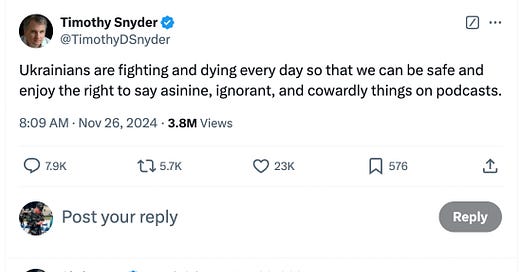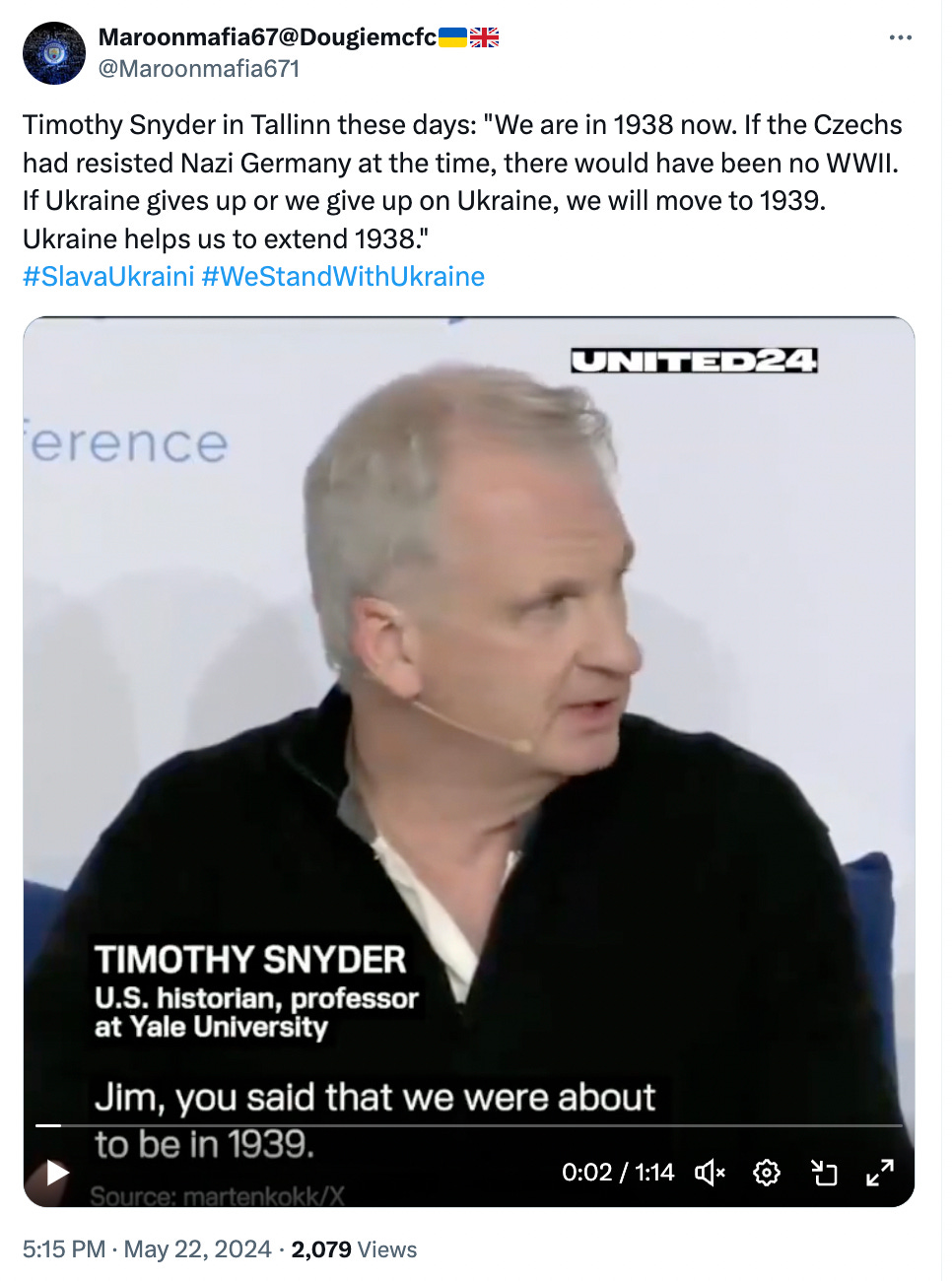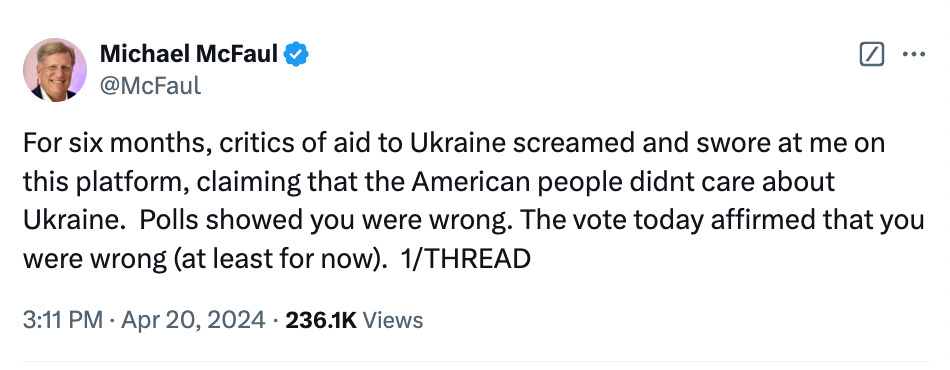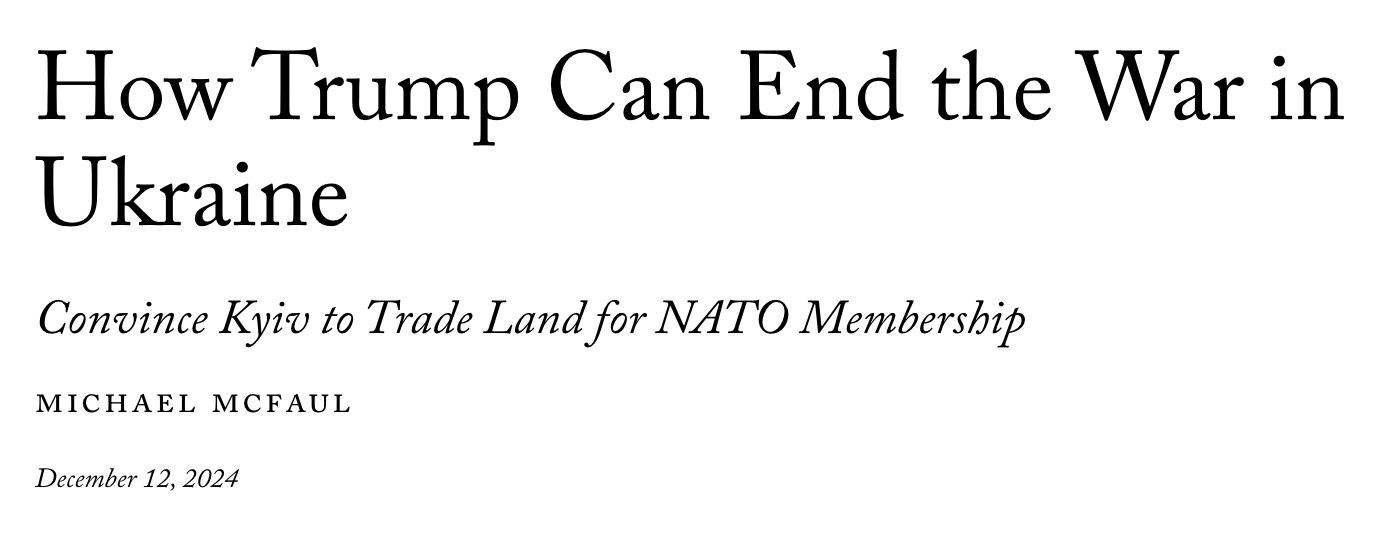I’m not an expert on Ukraine, I’m not an expert on Russia, and I’m not an expert on military strategy. But as I’ve watched the war in Ukraine, and watched the American and NATO escalations in that war, I’ve asked over and over again how it ends. How does Ukraine win? What’s the path to victory? I’ve asked in a spirit of basic common sense, not claiming certainty: How does a small nation prevail in a long war of attrition against a larger nation, even with significant outside help? I’m open to an answer, if someone can offer it.
But if you’ve participated in any version this discussion on social media over the last two years, you know what the answer to that question has been, every time: WHY DO YOU LOVE PUTIN!?!?!?!? There’s no discussion; there is only accusation and deflection. If you have doubts about the outcome of the war, you’re against freedom and democracy and peace and motherhood and puppies, and you’re just generally a monster and a coward:
And of course, discussion about the war in Ukraine has proceeded on the insipid basis of a framework in which all history is Hitler, and no other analogies ever come to mind:
The two leading American academic ghouls who’ve served as cheerleaders for the mass killing in Ukraine have been Snyder, at Yale, and Michael McFaul, at Stanford. On NPR today, following up on a recent essay in Foreign Affairs, McFaul offered a modified limited hangout, a shrugging concession that maaaaaybe Ukraine isn’t going to win and Russia should just be given some of the country? But McFaul’s relentless dishonesty marches on, as he hangs his arguments on an obviously false framework. The discussion at NPR is only five minutes long, and you can listen to it yourself here. Bust out a pencil and keep a running tally of strawmen.
In both the Foreign Affairs essay and the NPR discussion, McFaul says recent polling shows that most Ukrainians — in the essay, 88% — believe Ukraine will win the war, and are reluctant to stop fighting. Not mentioned, and notice that the tail of this chart merely assumes a modest future rebound:
Almost all Ukrainians support the war, not counting the third of the country that has fled or died. Devastating demographic collapse versus declared rhetorical enthusiasm, real thing versus symbol thing.
McFaul also argues that the path to the end of the war includes Ukrainian membership in NATO, because “NATO membership offers real security.” He proves this with the observation that Russia has never attacked a NATO country, and “by the way, NATO has never attacked Russia or the Soviet Union.” (You can hear this claim just past the two-minute mark in the NPR interview.)
But of course, NATO is currently attacking Russia, through the thin veil of a proxy, providing long-range missiles (among many other weapons) that the Russians have argued can only be operated directly by NATO troops:
In September, Russian President Vladimir Putin said Ukraine's military was incapable of deploying sophisticated long-range weapons without direct input from NATO specialists. So if Ukraine strikes deep inside Russia, he said, "This will mean that NATO countries — the United States and European countries — are at war with Russia."
So what does it mean to say that NATO has never attacked Russia — during a NATO proxy war against Russia? If you want to argue that the ATACMS strikes are justified, that’s a different argument than the one in which NATO has simply never attacked the country NATO is currently attacking.
Then, just before the three-minute mark, McFaul warns that Putin will “Russify those territories that he’s occupying, so that, over time, they’ll feel like they’re part of Russia.” But the Donbas is Russian-speaking, with a recent history of Russian separatism, so how would one Russify Russian speakers in Russian border regions with a population that feels at least some degree of cultural connection to Russia?
Repeating myself: We have, in the United States and in the West generally, the forms of debate without the substance of debate. We have experts who gloss over the obvious problems that infest their glib theories, generally unchallenged, and policies that are based on bulldozing rather than arguments. We have no real exchange of views — OH DID PUTIN TELL YOU TO SAY THAT? — and so few of our actions are undertaken in a climate of information. Critics mindlessly scream and swear, loud and dumb, and their objections can never be valid.
So we have years of ghastly war in which anyone who doubts the outcome is a fool and a monster and a Putin-loving conspiracy theorist, followed by an increasingly likely outcome that looks a great deal like the outcome the fools and conspiracy theorists have seen coming.
Familiar.








Would ask McFaul to weigh in, but he has ignored my emails for years and blocked me on I-still-call-it-Twitter.
Chris-
Every time one of these lawn-flag-flying-freedom-fighters says something like this online i reply with something like this:
Easy for you to say from a keyboard.
Why don't you ask the people who live in the "reclaimed" land to see what they think.
I think you'll be surprised with their answers.
I don't agree with Putins actions...but alas there's only one constant in mankind:
Conflict over real estate.
Let me know how you plan to fix that from your keyboard
CRICKETS